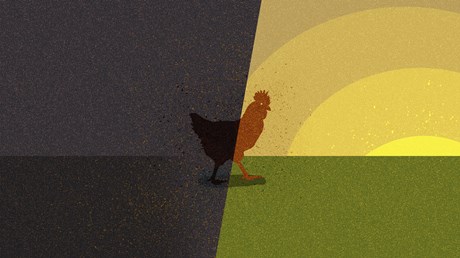Like Peter, we too are offered freedom, though we deny him.

When my parents entered their latter years, they took up a new hobby: keeping chickens. At the height of their enthusiasm, they tended 21 chickens in a hen house affectionately dubbed the Taj Mah’Omelette—20 chickens, that is, and one noisy rooster. To be a houseguest during this season was to have, as they say, a rude awakening—albeit one followed by a magnificent breakfast.
The briefest Google search confirmed what I suspected to be true from my own brief exposure to the Taj Mah’Omelette: Roosters crow and crow. They crow every morning, and they crow all morning. They crow to announce another day, but they continue crowing as long as it is called “today.” We just notice it more in the morning because roosters are particularly adamant when they wake up.
Roosters populate ancient fables and mythologies, and they make a notable appearance in the Bible. All four Gospels record Peter’s famous three-time betrayal of Jesus punctuated by the crowing of a rooster, just as Jesus had prophesied. All three synoptic Gospels say Peter “wept bitterly” at the sound.
Our senses are powerful memory holders. The smell of mothballs transports me to my grandparents’ attic where I played dress-up. The taste of pound cake transports me to my mother’s kitchen where I licked batter from a wooden spoon. Sounds, too, attach themselves to memories. From childhood, an old screen door banging shut is the sound of homecoming to me.
I imagine what kind of memory the rooster’s crow evoked for Peter. Every dawn after that first terrible morning of betrayal, the proclamation of his bitter guilt would have rung afresh in his ears. Carried in the crowing would have been the memory of his ...
from Christianity Today Magazine
via

.gif)

.gif)

.gif)
.gif)
